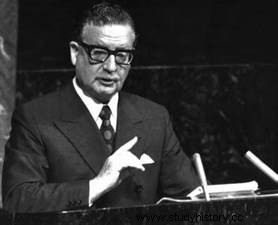 Salvador Allende (1908-1973) was a Chilean statesman, who served as President of the Republic of Chile from 1970 to 1973. On September 11, 1973, the socialist government of Salvador Allende was the target of a military coup directed by General Augusto Pinochet . The one who had represented the hope of the left of an entire continent, kills himself shortly before the putschists seize him. For Chile, it was the beginning of a fierce dictatorship that would last for almost 15 years, under the rule of Pinochet . Symbol of the wave of anti-communist authoritarianism that South America experienced during the 1970s, the coup d'etat of September 11, 1973 combines Chilean domestic themes and international issues of the Cold War.
Salvador Allende (1908-1973) was a Chilean statesman, who served as President of the Republic of Chile from 1970 to 1973. On September 11, 1973, the socialist government of Salvador Allende was the target of a military coup directed by General Augusto Pinochet . The one who had represented the hope of the left of an entire continent, kills himself shortly before the putschists seize him. For Chile, it was the beginning of a fierce dictatorship that would last for almost 15 years, under the rule of Pinochet . Symbol of the wave of anti-communist authoritarianism that South America experienced during the 1970s, the coup d'etat of September 11, 1973 combines Chilean domestic themes and international issues of the Cold War.
Salvador Allende and Popular Unity
Born in 1908, Salvador Allende comes from a bourgeois family with liberal values. A doctor by training, his great passion remained political life, which he joined as a student leader in the early 1930s. One of the founding members of the Socialist Party of Chile in 1935, he remained attached to this structure on which his influence would become gradually decisive. Member of Parliament, then Minister of Health in 1938 (at age 30!), he became Secretary General of the Chilean Socialist Party in 1944.
A man of integrity, of great intellectual finesse, Allende represents the respectable and moderate face of the Chilean left. Although interested in more radical experiences such as the Cuban revolution, he advocates a peaceful and democratic transition to socialism, deeply original at a time and on a continent marked by the myth of "armed struggle". Having become popular in the mid-1960s, he soon had to face the hostility of the conservative right and his American supporters who considered him a potential agent of Moscow.
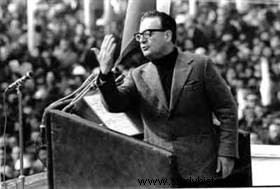 During the 1960s, Chile, whose economy was marked by strong inflationary tendencies, underwent profound modernization. Although Christian Democracy has been in power since 1964 and is carrying out progressive reforms (notably the beginning of agrarian reform, the modernization of the education system, the establishment of public enterprises in strategic areas), it cannot prevent the rise in power from the left and its emblematic representative:Salvador Allende.
During the 1960s, Chile, whose economy was marked by strong inflationary tendencies, underwent profound modernization. Although Christian Democracy has been in power since 1964 and is carrying out progressive reforms (notably the beginning of agrarian reform, the modernization of the education system, the establishment of public enterprises in strategic areas), it cannot prevent the rise in power from the left and its emblematic representative:Salvador Allende.
In view of the presidential elections of 1970, Salvador Allende manages not without difficulty to federate the left and the center-left around his candidacy, within the framework of Popular Unity ( Unita Popular). This gathering of parties, from the communists to the Christian left, enjoys the support of the trade unions and proposes a vigorous program of reform. In addition to the fight against inflation, Popular Unity foresees a revival of agrarian reform, the nationalization of banks and especially of the copper industry, a strategic sector with strong American participation. Faced with Allende, the right approaches the elections divided between Christian Democrats and Conservatives. The conservative candidate Alessandri is counting on the support of the army (many of whose cadres are anti-communist) and the United States.
Allende president, between hope and threats
The September 1970 election, marked by a very strong polarization of opinion, produced a close result:36.6% for Allende, 35.3% for Alessandri and 28.1% for the Christian Democrat Tomic. In the absence of an absolute majority, the Chilean constitution provided for Congress to choose the new president. During the weeks that followed, a tough parliamentary fight ensued, a fight in which the United States (via the CIA) would use all their weight to prevent Allende from being elected. Thus, Washington implements a plan to push the Chilean army to rebel. This attempt fails in dramatic circumstances (the commander-in-chief of the army, a loyalist, will moreover be the victim). Anyway, a secret agreement between Tomic and Allende allows the latter to become president on the occasion of the vote of Congress on October 24.
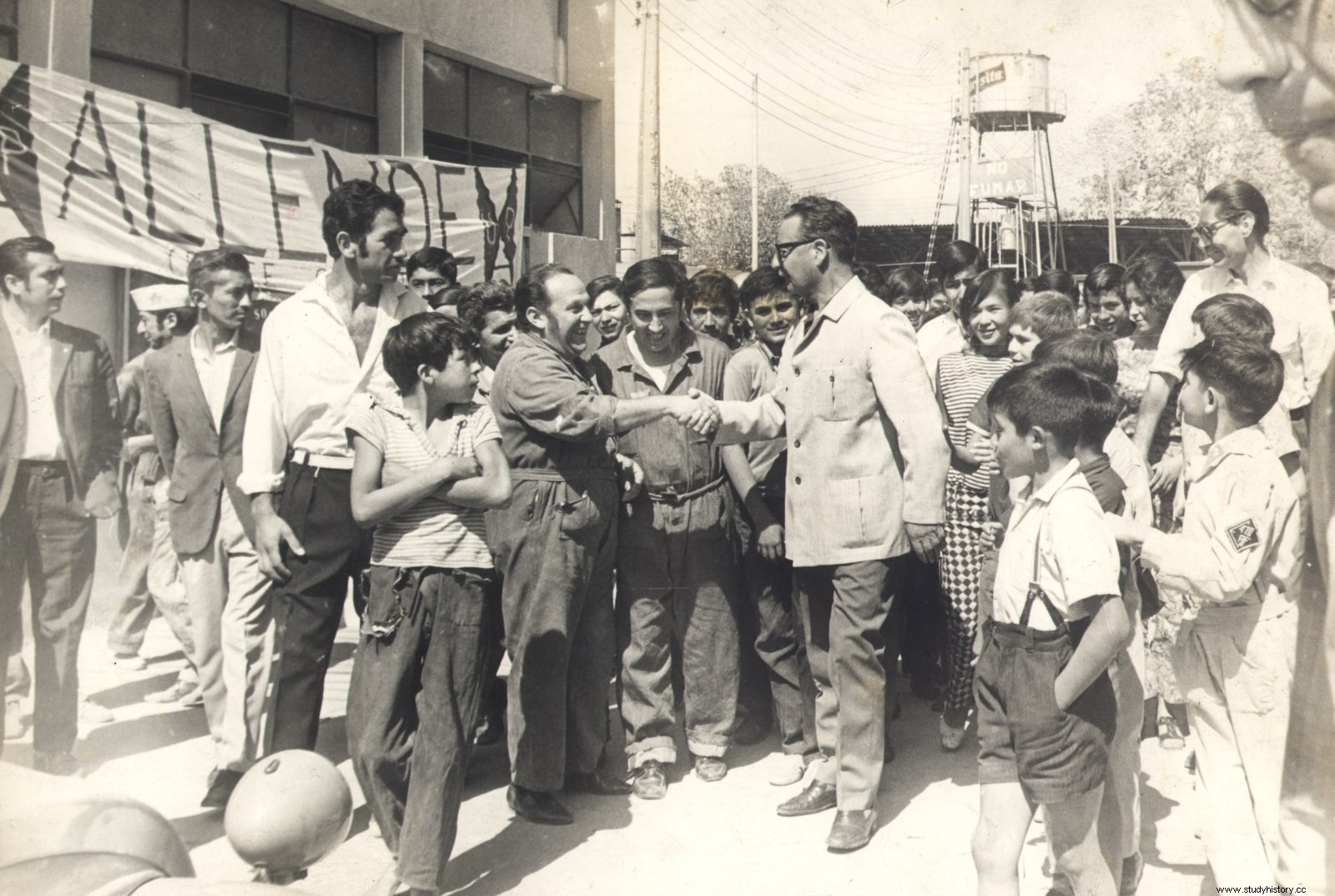 Salvador Allende quickly implements the Popular Unity program. The showdown with the right begins on the ground of the nationalization of the copper industries. In the summer of 1971, the measure was finally put in place, with the Chilean State becoming the owner of the copper mines in return for compensation for the companies that had operated them until then.
Salvador Allende quickly implements the Popular Unity program. The showdown with the right begins on the ground of the nationalization of the copper industries. In the summer of 1971, the measure was finally put in place, with the Chilean State becoming the owner of the copper mines in return for compensation for the companies that had operated them until then.
Washington's response was immediate:on the advice of Henry Kissinger, President Nixon organized a boycott of international loans to the Chilean government. If at first the policy of the Allende government seemed to be a success (inflation fell, purchasing power increased, growth was vigorous), the year 1972 saw the emergence of worrying difficulties.
On the one hand, the reforms undertaken and external pressure (mainly from the United States) are leading to a renewed polarization of Chilean society. Agrarian reform (sometimes accompanied by land confiscation) causes some farmers to violently oppose the government. The tension is also strong in the street, skillfully maintained by the opposition. Allende must also face the radicals of Popular Unity who demand an acceleration of the transition to socialism, even if it means going into armed confrontation with the right.
On the other hand, from mid-1972 onwards, there was a slowdown in growth and then a recession. Deprived of the support of economic elites and sources of international financing, Chile faces the infernal spiral of debt and inflation. The population, seeing their living conditions deteriorate sharply, regularly protests in the street.
Popular unrest was compounded by Allende's difficulties in governing, due to the vigor of the parliamentary opposition and the string of resignations of ministers. The right, this time grouped within the CODE (Democratic Confederation of Chile) even tries to obtain the dismissal of the president, which it just misses. Finally, the army, which until then had been controlled by General Prats, Minister of Defense and loyalist, decided to act openly.
Augusto Pinochet takes the stage
In the summer of 1973, Prats was harshly criticized by his peers for his loyalty, while the country was plunged into a serious crisis by the truckers' strike (whose vital role is explained by the geography of the country). Under pressure, Prats resigned as Minister of Defense and Commander of the Army on August 23, 1973. Allende appointed General Augusto Pinochet to replace him. Reputed to be small and relatively apolitical, it stifled an attempted rebellion by an armored regiment two months earlier. Of Breton origin, this career Catholic soldier born in 1915, has so far kept away from the plots that are brewing in the army against Allende.
Nevertheless he is contacted by Admiral Merino, the commander in chief of the navy, and soul of the conspiracies against the President. Merino, who can boast of the support of a good part of the corps of general officers and of the United States (whose role in the putsch itself is still debated), plans to take action during the maneuvers that the Chilean Navy organizes jointly with the US Navy in early September. These exercises will provide the necessary cover for the putsch, in which the marine infantry troops must play an essential role.
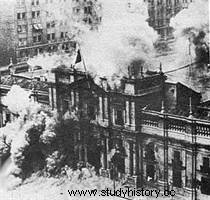 Pinochet, after initial reluctance, realizes that his opposition to Merino's plan could cost him his career, if not his death. life. He therefore rallied to the putschists. The general who had been a loyalist until then turned out to be a talented plotter. He takes the upper hand over his rivals in the four-member junta scheduled to lead the country after the overthrow of President Allende. Pinochet also insists on the need to physically eliminate the president, to whom he owes his position. On the other hand, he does not intend to return power to the parliamentary right once the putsch is successful. Augusto Pinochet now has great personal ambitions…
Pinochet, after initial reluctance, realizes that his opposition to Merino's plan could cost him his career, if not his death. life. He therefore rallied to the putschists. The general who had been a loyalist until then turned out to be a talented plotter. He takes the upper hand over his rivals in the four-member junta scheduled to lead the country after the overthrow of President Allende. Pinochet also insists on the need to physically eliminate the president, to whom he owes his position. On the other hand, he does not intend to return power to the parliamentary right once the putsch is successful. Augusto Pinochet now has great personal ambitions…
Putsch of September 11, 1973 and fall of Allende
On September 11, 1973, a few hours before dawn, marine infantry troops seized the port of Valparaiso (the economic lung of the country) without firing a shot. A few hours later, the army enters the dance and imposes its authority over most Chilean cities. In Santiago, the capital, it undertakes with the help of aviation, to silence radios and television channels.
Allende, isolated and ill-informed, takes refuge in La Moneda (the presidential residence) accompanied by his bodyguards. At 8.30 a.m., he still believes part of the army to be loyal and even appeals to Pinochet, whom he thinks is loyal. His appeals are only answered with a request for resignation. Allende refuses, citing his constitutional duties to the Chilean people. Anyway, this request was only a maneuver by Pinochet to delete it later. After a final radio address to the Chileans, the president resigned himself to facing the onslaught of the army, with his 42 bodyguards.
At 9 a.m., the siege of La Moneda was engaged with a large reinforcement of armored vehicles and infantry. Held in respect by the snipers of the Allende guard, the soldiers call on the air force which bombards the residence. Heavy fighting ensues, with the President's guards eventually succumbing to sheer numbers. At 2 p.m., when the guns fell silent, Salvador Allende was found dead. He probably committed suicide, in circumstances that are still controversial today. Legend has it that the weapon he used was a gift from Fidel Castro (an AK 47 rifle), adorned with the following inscription:"To my good friend Salvador, from Fidel, who tries by different means to achieve the same goals. Certainly too good to be true, the anecdote is no less symbolic of Allende's failure to escape violence.
The Pinochet dictatorship
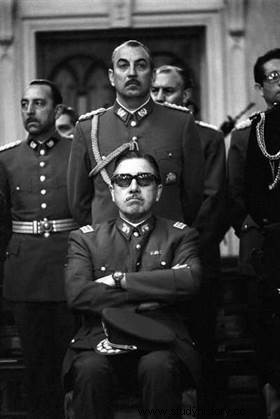 In the days following the coup, Augusto Pinochet brought the country to heel, while maintaining personal power. After having dissolved all the representative institutions (the congress, the municipalities), but also the parties and the unions, he organized repression within the framework of the state of emergency. More than 100,000 people will be arrested, more than 3,000 will be executed or simply disappear. Although officially condemning this state violence, the United States supported the new regime, which became one of its best supporters in the fight against "communism" in South America (in the context of "Operation Condor"). ).
In the days following the coup, Augusto Pinochet brought the country to heel, while maintaining personal power. After having dissolved all the representative institutions (the congress, the municipalities), but also the parties and the unions, he organized repression within the framework of the state of emergency. More than 100,000 people will be arrested, more than 3,000 will be executed or simply disappear. Although officially condemning this state violence, the United States supported the new regime, which became one of its best supporters in the fight against "communism" in South America (in the context of "Operation Condor"). ).
Became head of state in 1974, Augusto Pinochet did not leave power until 1990, after a slow democratic transition that began in October 1988. Remained influential in his country (and even popular in part of the opinion), the senator for life Pinochet was arrested in London in 1998, following an international arrest warrant issued by the Spanish judge Garzon. This is the beginning of long legal battles, which will not find an outcome because of the state of health of the former dictator. Augusto Pinochet died on December 3, 2006 of pulmonary oedema, without ever having regretted his actions...
Salvador Allende enjoys a state funeral in 1990, upon the return to a civilian government.
Bibliography
- Chile, September 11, 1973, Democracy Assassinated, by Eduardo Castillo. Feathered Serpent, 2003.
- Salvador Allende:The Intimate Inquiry, by Thomas Huchon. Eyrolles, 2010.
- Salvador Allende:The other 9/11 by Antoine Blanca. 2003.
- Pinochet:A model dictator by Jean-Christophe Rampal. Hachette, 2003.
